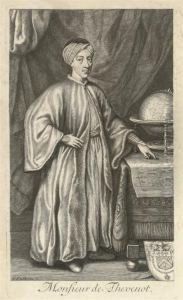Jean De Thevenot Paintings
Jean de Thévenot was a notable French traveler and collector, born in 1633 into a wealthy and influential family. His curiosity about the world and its diverse cultures drove him to embark on extensive travels that would make him one of the most celebrated explorers of his time. Unlike many of his contemporaries who were primarily concerned with colonization or trade, Thévenot's interest lay in understanding the customs, languages, and scientific knowledge of the places he visited. His journeys took him through the Middle East, India, and the Far East, contributing significantly to European knowledge of these regions during the 17th century.
Thévenot's travels commenced after he received a substantial inheritance, which enabled him to explore without financial constraints. He first ventured to the Levant, including Egypt, where he studied Arabic and developed a keen interest in local customs and practices. His journey continued through Persia (modern-day Iran) and eventually led him to India, where he spent several years. Thévenot was meticulous in his observations and recordings, covering a wide array of subjects from botany and zoology to the social and religious practices of the people he encountered.
Upon his return to France, Thévenot published several accounts of his travels, which were widely read and translated into multiple languages. These works provided invaluable insights into regions that were largely unknown to his European contemporaries and fueled the European imagination with tales of exotic lands and peoples. His contributions to geography and ethnography were recognized by his induction into the Académie Royale des Sciences, highlighting his significance in the scientific community of his time.
Jean de Thévenot's legacy extends beyond his written works. He amassed a significant collection of artifacts and natural specimens during his travels, which he bequeathed to the Royal Library in Paris. This collection served as an invaluable resource for scholars and contributed to the development of museology. Thévenot's dedication to understanding the world and sharing his knowledge with others has cemented his place in history not only as a traveler but also as a pioneer in the fields of anthropology and museum studies. He died in 1667, but his works and collections continue to inspire curiosity and a desire to understand the diverse cultures of the world.
